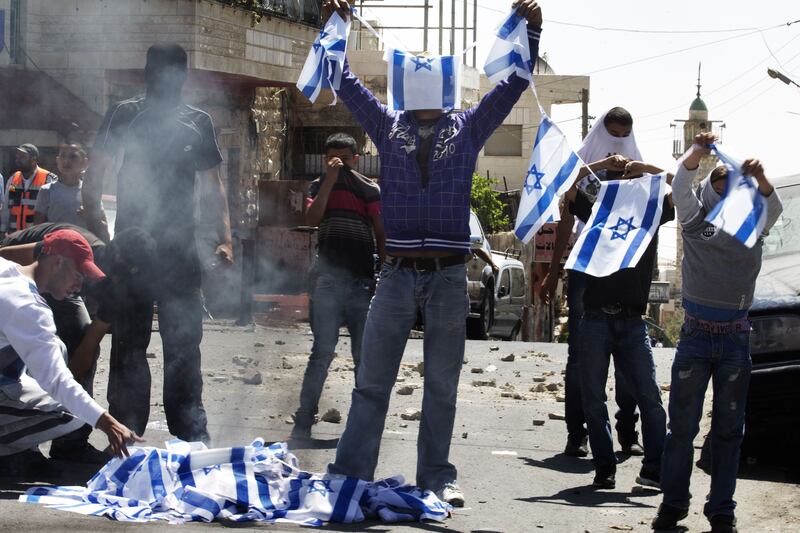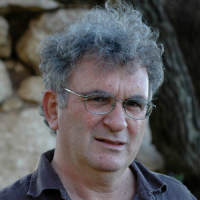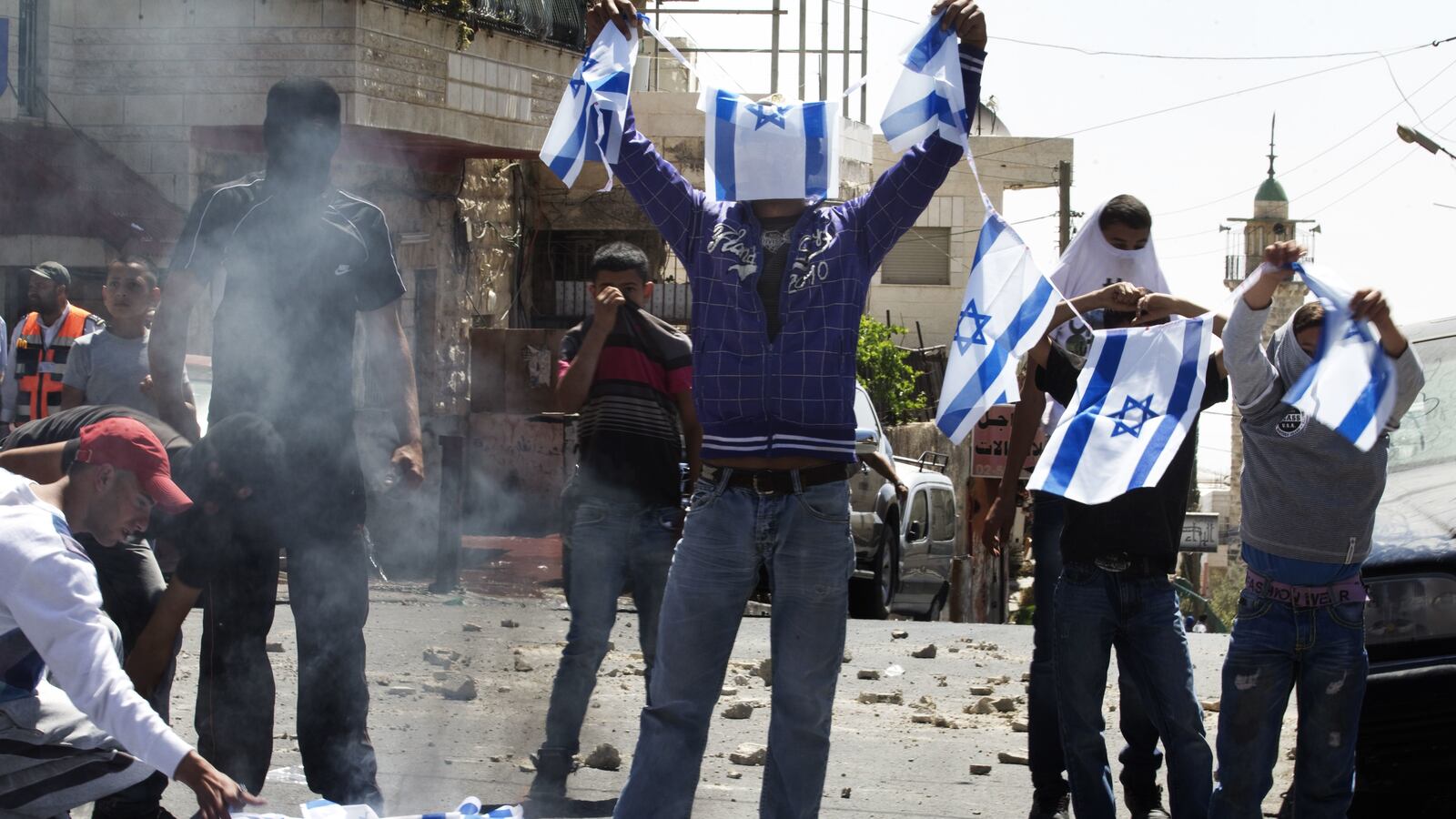Last week the Palestinians commemorated Nakba (catastrophe) Day, on which they remember the disaster that befell them in 1948, when they lost their war against Zionism and two-thirds of them were displaced from their homes, becoming refugees. While it is perfectly natural for the Palestinians to commemorate their national tragedy, the date they have chosen carries a clear political-ideological message, and it is not one that will encourage would-be Middle East peacemakers.
On Tuesday, there were demonstrations in the refugee camps in the countries surrounding Israel and in Israeli Arab towns, some low-key rock-throwing and tear gas at the crossing points between the West Bank and Israel (no deaths), and a controversial demonstration of several hundred Israeli Arab students and their Jewish sympathizers in Tel Aviv University.

The university, incidentally, sits on the lands of Sheikh Muwannis, an Arab village depopulated on 30 March 1948 (one of about four hundred depopulated in the course of the war). Israel’s Education Minister, Gideon Saar (Likud), asked the university to ban the protest, but the university authorities decided to allow it, though refused to provide security, forcing the organizers to supply their own stewards. Haifa University, which initially approved a similar demonstration, at the last minute imposed a ban, arguing a potential danger of disorder and a threat to public safety. The Haifa demonstrators then gathered outside the campus gates both to commemorate the nakba and to protest against the university’s prohibition.
Both sides had a case. The opponents of the demonstrations were able to point to the law of the land. Last January the Israeli Supreme Court approved a law passed in the Knesset in March 2011—the so-called “Nakba Law”—that allows the state to refuse funding to any activity “that involves the negation of the existence of the State of Israel as the state of the Jewish people…[that supports] armed struggle…against the state…[or that supports] incitement to racism, violence and terror and dishonoring the national flag or the national symbol.” Israel’s universities are all state-subsidized institutions. Over the years, Nakba Day demonstrations—inaugurated by Yasser Arafat in 1998—have resulted in anti-Israeli violence.
In an editorial on May 15th, Haaretz, Israel’s leading daily newspaper, linked the effort to ban the Tel Aviv University demonstration to what it called “the state’s giant effort” to erase the nakba from public memory. The editorial concluded: “Nakba Day belongs not only to the Arabs; it is an inalienable part of the story of the establishment of the State of Israel.”
And, of course, Haaretz was right. Peoples need to remember not only their glory days but also the dark moments and sides of their history. In the case of Israel, the moment of its birth was also the moment of the destruction and wholesale displacement of Palestinian society. The Palestinians paid a bitter price for Israel’s creation.
But there is something curious, and depressing, about the Palestinians’ choice of the day on which to remember their catastrophe, May 15th. On 15 May 1948 the armies of Egypt, Syria, Iraq and Jordan invaded Palestine, the first three attacking the territory of the newborn State of Israel (Jordan’s army, the Arab Legion, occupied only the area earmarked by the UN partition resolution for Palestinian Arab statehood and areas earmarked for international control (i.e., East Jerusalem); it did not attack the Jewish state’s territory, though it did attack Jewish settlements outside that territory).
The day before, on May 14th, 1948, the Zionist leadership had declared the establishment of Israel. Hence, in their choice of date, the Palestinians’ Nakba Day demonstrators are voicing opposition to Israel’s establishment and lamenting the Arabs’ continuing failure to destroy it—as well as bewailing their own national catastrophe.
In consonance with this, the prevailing chant and slogan at the demonstrations, around the Arab world, in Beirut and Ramallah, as by Tel Aviv University’s Arab students, was ”O Palestine, with blood and fire we will redeem you” and “Free Palestine,” by which the chanters meant, and know they meant, all of Palestine, which is tantamount to a call for Israel’s destruction and replacement by a (Muslim) Arab Palestine. The claim they make is to Tel Aviv and Degania Aleph and Bet (the iconic kibbutzim in the Jordan Valley), as well as to Sheikh Muwannis. No two-state solution here.
It would have made more sense to mark Nakba Day on November 29th, when, in 1947, the UN resolved on the establishment of two states in Palestine, one Jewish, the other Arab, and when the Palestinian Arabs and the wider Arab world rejected the resolution. Or on April 9th, the day in 1948 when Zionist troops conquered the village of Deir Yassin, exiling its population and massacring some of its inhabitants. Indeed, “Deir Yassin,” for many, has become the symbol of the Nakba. Or the Palestinians could have chosen some other day of catastrophe, loss and exile, say April 22nd 1948, when Arab Haifa fell, its population departing for Lebanon and Nazareth, or May 13th, when the Arab town of Jaffa surrendered after most of its inhabitants fled.
But the Palestinians, led by Arafat and the PLO, preferred May 15th, and have stuck to that date, with Arafat’s successor, Mahmoud Abbas, last week reiterating the “sanctity” and immutability of the “right of return” of the Palestinian refugees (meaning those still left of the 700,000 or so displaced in 1948 and their descendants), whose mass return, if implemented, will necessarily spell the doom of the Jewish state. (There are 5-6 million Palestinian refugees, and 5.7 million Israeli Jews and 1.4 million Israeli Arabs.)
The problem for Arafat with November 29th was that choosing it would have at once implied recognition of Israel’s legitimacy and explicitly drawn attention to Palestinian rejectionism vis-a-vis the two-state solution (the day after, November 30th, 1947, Palestinian gunmen launched the hostilities that were the start of the 1948 War); and the later dates—the 9th and 22nd of April or the 13th of May—all marked Palestinian tragedy and dispossession. But Arafat was bent on perpetuating rejectionism and heralding Israel’s eventual demise.
In line with such thinking, another Palestinian stalwart, Hanan Ashrawi, a member of the PLO Executive Committee and a professor of English literature, published a Nakba Day article last week highlighting pre-1948 Palestinian culture (“in the area of arts, music, and drama, Palestinian creativity was boundless”) that was “crushed by [Israeli] violence.” Nowhere does she mention that the 1948 War was launched by the Palestinians; nowhere does she call for a Palestinian accounting for their actions, then and since. Rather, she demands simply that Israel recognize “our [Palestinian] historical narrative.”
So perhaps the last word should go to Neve Gordon, a Ben-Gurion University lecturer who cannot be damned for an excessive love of Zion: indeed, he has gained prominence (or notoriety) for his calls for an international boycott of Israel’s universities (including his own). Last week he too published a Nakba Day article, in Al Jazeera online, in which, while demanding that Israelis recognize Palestinian suffering, he also called on the Palestinians to recognize the Jewish-Israeli narrative: “The Nakba is a truth… but the recognition must be reciprocal. The Palestinians… must concede [that the Jews, who suffered the Holocaust, have a case]… Only once there is mutual recognition of the two historical narratives will an opportunity for reconciliation truly emerge.”






